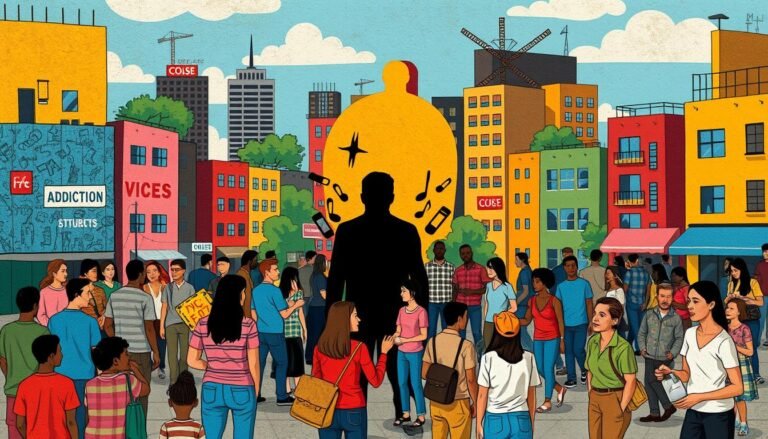The Sociology of Law: How Laws Influence Society
Have you ever thought about how laws shape our society? The sociology of law looks into this interesting mix. It shows how laws and social norms work together to make our world. From courts to community areas, laws and social control affect us more than we think.
Imagine Congresswoman Marcy Kaptur standing at the U.S. Supreme Court steps, fighting for voter rights. This shows how law and society always meet. The sociology of law looks at these meetings. It helps us see how laws affect our everyday lives and social groups.
Experts like Max Weber and Émile Durkheim started this study. Weber said clear laws are key for modern politics. Durkheim looked at how laws changed from just punishing to fixing problems in complex societies. Their ideas help us understand the link between laws and social life.
Now, the sociology of law covers many topics. It looks at legal diversity and power through thinkers like Michel Foucault. This field keeps growing, giving us new views on how laws change and reflect society.
Key Takeaways
- The sociology of law studies the relationship between legal systems and society
- Scholars like Weber and Durkheim pioneered this interdisciplinary field
- Legal pluralism recognizes multiple legal systems within one social field
- Law acts as a mechanism of social control by establishing norms
- The field explores how legal reforms impact social structures and behaviors
- Understanding legal pluralism is crucial in our globalized world
Understanding the Sociology of Law
The sociology of law looks at how laws and society are connected. It combines legal and social sciences. It shows how laws reflect and shape cultural values and power.
Definition and Scope
This field studies legal issues in society. It moves past just looking at laws to see their role in society. By using social science, it examines how laws affect and are affected by society.
Historical Development
The study started with early sociology. Now, it covers many aspects of law in society. It looks at where legal norms come from, their effects, and how far law can go in changing society.
Key Contributors
Weber, Durkheim, and Ehrlich helped start the sociology of law. Their ideas changed how we see the link between law and social norms.
| Contributor | Focus Area | Key Concept |
|---|---|---|
| Max Weber | Legal rational domination | Bureaucratic states |
| Émile Durkheim | Law transformation | Repressive to restitutive law |
| Eugen Ehrlich | Living law | Distinction from positive law |
Their work still shapes how we look at the justice system and its effects on society today.
Legal Systems and Social Structure
Legal systems are key to how societies are organized. They reflect and shape social structures. Laws are made, interpreted, and enforced in different social settings.
Cultural values greatly influence legal frameworks. As societies change, so do their laws. This shows how legal systems and social structures work together.
Sociology studies legal systems to see how they keep society in order. It looks at how laws solve conflicts and change with society. It also looks at how laws interact with politics, economics, and culture.
“The sociology of law is divided into two main problems: how law is differentiated from custom and how criminal law is administered.” – Clarence Ray Jeffery
Clarence Ray Jeffery pointed out in 1956 that American criminology didn’t focus much on law and society. He believed criminology should study institutions, not just individual criminals.
| Aspect | Focus |
|---|---|
| Normative Facts | Legal rules and norms |
| Non-normative Facts | Societal behavior and practices |
| Penal Law | Criminal justice system |
| Legal Rules | Civil and administrative regulations |
Studying legal systems and social structures involves looking at history, comparing different places, and analyzing how things work. These methods help us see how institutions are connected and change over time. Sociologists call this an “institutional complex” or “functional system.”
The Relationship Between Law and Social Norms
Laws and social norms deeply affect our lives. Cultural values help shape legal systems. At the same time, laws control society. This interaction changes behavior and leads to social change.
Cultural Values and Legal Frameworks
Legal systems mirror a society’s cultural values. Many places have legal pluralism, where state laws meet religious and customary norms. This mix influences what people see as right and wrong, affecting law development.
Social Control Through Legislation
Laws act as a way to control society, with clear consequences for breaking them. Often, what starts as a social norm becomes a law. For instance, bigamy is now illegal in the U.S., showing a shift from taboo to law.
Law’s Role in Shaping Behavior
The COVID-19 pandemic showed how laws can change behavior quickly. In the UK, a lockdown law reduced park visits by 30% and boosted support for staying home by 15%. Laws can correct wrong beliefs about norms and guide actions.
| Impact of UK Lockdown Law | Before Law | After Law |
|---|---|---|
| Park Visits | 100% | 70% |
| Support for Stay-at-Home Measures | Baseline | +15 percentage points |
Laws are key in tackling deviance, bringing social change, and balancing power. They reflect cultural shifts and drive societal change. This shows the strong link between laws and social norms.
Power Dynamics in Legal Institutions
The justice system shows us how power affects social equality. Legal institutions are key in applying cultural values and keeping order. But, they often reflect the inequalities in our society.
Research tells us that different social groups have different access to legal help. This difference changes how people deal with the law. For example, those on the margins might find it harder to get through the legal system.
Legal experts have a big impact on legal outcomes. Their choices can either keep or change the current power balance. This underlines the importance of having a diverse legal team for fair decisions.
Studies show that legal decisions can be biased. Unconscious biases can influence judgments, which can hurt the idea of equal justice for everyone. Fixing these biases is key to a fairer justice system.
“The law, in its majestic equality, forbids rich and poor alike to sleep under bridges, to beg in the streets, and to steal their bread.” – Anatole France
Knowing about these power dynamics helps us make our legal system better. By tackling inequalities, we can aim for a justice system that supports social equality and our changing values.
The Sociology of Law: How Laws Influence Society
Laws deeply affect our society. They mirror changing social values and push for change. The study of law and society looks at how laws and society interact.
Law as a Mirror of Social Change
Legal changes often follow shifts in social values. Studies show that 38% of theories focus on the link between law and society. This shows how laws adjust to new cultural norms.
Legal Institutions Driving Social Progress
Courts, legislatures, and regulatory bodies can drive change. The National Labor Relations Act of 1935 boosted union membership by 20%. This shows laws can change society’s power balance. These institutions are key to controlling society and ensuring fairness.
Laws and Social Equality
Legislation greatly affects social equality. Research shows class can affect how laws are applied, with a 15% difference. As society changes, our laws must too to ensure justice for everyone.
“The law is a living instrument which must be interpreted in the light of present-day conditions.” – European Court of Human Rights
Studying the sociology of law helps us see how laws shape our world. It shows the complex relationship between social values, power, and legal systems in our society.
Legal Consciousness and Social Behavior
Legal consciousness affects how we see and deal with laws every day. It’s a key area of study, attracting experts from many fields. Over the past 40 years, it has grown to look at how laws and society interact.
Studies show that legal awareness changes our views, thoughts, and choices. It’s key in setting social norms and cultural values. Researchers have found three main views: Identity, Hegemony, and Mobilization. Each sheds light on how people see and act towards the law.
The Identity view looks at how our personal stories shape our legal views. It helps explain why some might break the law even knowing the risks. The Hegemony view sees how laws keep society in order. The Mobilization view looks at how people use laws to bring about change.
“Legal consciousness refers to the ways in which people experience, understand, and act in relation to law, encompassing cognition and behavior.”
Recent studies focus on how legal awareness varies in non-Western cultures and among marginalized groups. This view shows how our surroundings affect how we see and act on laws. It points out that our cultural beliefs greatly influence how we understand laws in different places.
Knowing about legal awareness helps us see why laws sometimes work and sometimes don’t. It shows why some laws change behavior but others don’t. This info is vital for making better laws and keeping society together.
The Role of Law in Social Movements and Change
Law is key in making social change and changing cultural values. Throughout history, legal changes have sparked and reacted to big shifts in society. This back-and-forth between laws and social movements has brought about big changes in many areas of life.
Civil Rights Movements and Legal Reforms
Civil rights movements have often used the law to push for change. In the 1950s and 1960s, lawyers and activists teamed up to fight racial segregation and discrimination. They used lawsuits, laws, and advocacy to push for reforms that protected the rights of those left out.
Environmental Laws and Societal Awareness
Environmental activism has led to laws that protect our planet. These laws have made more people aware of environmental issues. As a result, more folks are living more eco-friendly, showing how laws can change culture and behavior.
Gender Equality Legislation and Cultural Shifts
Gender equality laws have been key in changing culture. Laws on workplace bias, reproductive rights, and same-sex marriage have changed what society accepts. These laws show how culture is evolving and push for more change.
| Social Movement | Key Legislation | Impact on Society |
|---|---|---|
| Civil Rights | Civil Rights Act of 1964 | Outlawed discrimination based on race, color, religion, sex, or national origin |
| Environmental | Clean Air Act of 1970 | Reduced air pollution and improved public health |
| Gender Equality | Equal Pay Act of 1963 | Prohibited wage discrimination based on sex |
The link between social movements, laws, and cultural values keeps shaping our society. As we face new issues, understanding this link is key to making positive change.
Comparative Law and Cultural Differences
Legal systems around the world show the unique values and norms of their societies. Comparative law looks into these differences, highlighting how culture shapes laws. It gives us insights into how various societies organize their laws and justice.
The functional method is key in comparative law. It looks at the effects of laws, not just the rules. By seeing how different legal systems handle similar situations, we learn about cultural differences.
Understanding legal cultures is a big part of comparative law. These cultures include attitudes, beliefs, and practices about law in different places. For example, some cultures put a big emphasis on individual rights, while others focus more on group harmony.
| Legal System Aspect | Western Culture | Eastern Culture |
|---|---|---|
| Conflict Resolution | Litigation-focused | Mediation-oriented |
| Rights Emphasis | Individual rights | Collective harmony |
| Legal Education | Case-based learning | Code-based learning |
Comparative law also shows how social norms affect legal practices. For example, aging populations have led to new laws about elder care and rights. These changes show how society and law work together.
“Comparative law is not just about rules, but about how societies use law to solve problems.”
By looking at these differences, legal experts and policymakers can better understand global legal diversity. This knowledge is key in our connected world, where laws often cross borders.
Challenges in Studying the Sociology of Law
The sociology of law has its own set of challenges. It aims to see how laws affect social change and handle deviance. Researchers face tough methodological issues, work across disciplines, and deal with ethical dilemmas.
Methodological Hurdles
Looking into how laws affect society is tricky. It requires both qualitative and quantitative methods. It’s hard to measure things like legal awareness and social norms. Also, getting to legal data can be tough, which limits studies on the justice system.
Bridging Disciplines
This field needs knowledge from law and social sciences. Scholars must combine insights from criminology, sociology, and jurisprudence. This helps them understand how laws affect behavior and society.
Ethical Considerations
Researching law and society brings up ethical issues. Researchers must keep participants’ info private. They also need to avoid biases in their research, especially when looking at controversial topics like deviance.
| Challenge | Impact | Potential Solution |
|---|---|---|
| Data Access | Limited understanding of legal processes | Collaborative partnerships with legal institutions |
| Interdisciplinary Gaps | Incomplete analysis of law-society interactions | Cross-disciplinary training programs |
| Ethical Dilemmas | Restricted research scope on sensitive issues | Robust anonymization techniques and ethical review boards |
Despite the challenges, the sociology of law is key to understanding how laws influence social change and handle deviance. By facing these challenges, researchers can reveal the complex relationship between law and society. This helps make the world more just and fair.
Conclusion
The Sociology of Law shows us how laws affect society. It’s like a dance between legal systems and social norms. Scholars like Max Weber and Émile Durkheim have greatly influenced this field since the mid-19th century.
This field has grown a lot. It helps us understand how laws change and reflect society. It’s an interdisciplinary approach that gives us new insights into legal systems.
It tells us that democracy can change in unexpected ways. Global norms and international human rights law play big roles. Judicial institutions have been key in building democracies, working with global norms.
The relationship between law and society is complex. Global laws are changing how national legislatures work. This opens new paths for social actors to get involved in making laws. It’s creating new forms of political agency linked to global norms.
In conclusion, the Sociology of Law keeps evolving. It gives us tools to tackle socio-legal issues. It shows us that laws are not just in courtrooms. They are part of our social fabric, always changing and being shaped by society.
Source Links
- Sociology of law
- What is the Sociology of Law?
- Law Through the Lens of Sociology
- The Sociology of Law potential: exploring its scientific landscape
- What is Law and Society? Or the Sociology of Law?
- Crime, Law and Social Structure Part I: Methodology
- Approaches to Law in Society
- How laws affect the perception of norms: Empirical evidence from the lockdown
- Exploring the Relationship Between Legal Systems and Societal Structures
- 1.3. Social Norms: Folkways, Mores, Taboo, and Laws
- The Law and Society Movement
- The Idea of Sociology of Law and its Relation to Law and to Sociology
- Law and Society – Sociology of Law – iResearchNet
- No title found
- Legal Consciousness Reconsidered
- Law and Social Change
- Social Movements Law and Implementation: A Clinical Dimension for the New Legal Process
- The Functional Method of Comparative Law
- The Place of Legal Culture in the Sociology of Law
- THE VALUE OF SOCIOLOGY TO LAW
- The Sociology of Law – What is it?
- Conclusion – The Sociology of Law and the Global Transformation of Democracy







